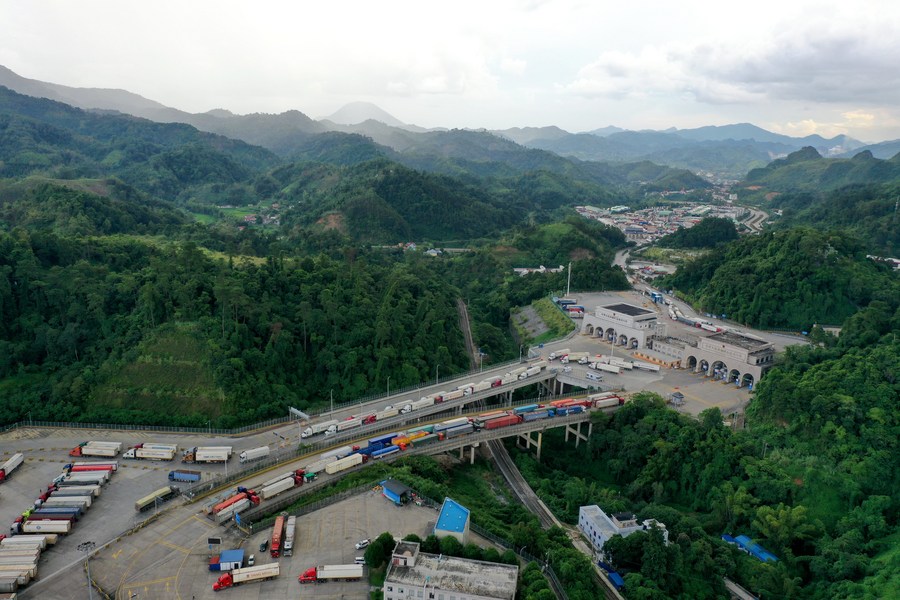Working together for enduring China-Vietnam friendship
Xinhua | Updated: 2023-12-11 14:06

Xi Jinping, general secretary of the Communist Party of China (CPC) Central Committee and Chinese president, will pay a state visit to Vietnam from Dec. 12 to 13 at the invitation of the Vietnamese side.
Six years after his last Vietnam trip, Xi's upcoming visit is bound to consolidate political mutual trust between the two countries, and promote mutually beneficial cooperation.
The trip will also tighten the bond between the two peoples, and provide a strong impetus for ushering in a new stage in bilateral relations at a higher starting point.
Over the years, both countries have witnessed frequent high-level exchanges and breakthroughs in practical cooperation, and their relations have seen ever-deepening popular support. Their special bond of "camaraderie and brotherhood" has benefited the two peoples and facilitated regional and world peace and development.
The friendship, deeply rooted in shared ideals and beliefs of the two countries with the same social system, has been epitomized in their respective foreign policies that regard the bilateral relationship as a priority.
Leaders of both sides have also established solid political mutual trust and profound comradeship to chart the course for future growth of bilateral relations and provide important strategic guidance.
In October, Xi met with Vietnamese President Vo Van Thuong, who was in Beijing for the third Belt and Road Forum for International Cooperation. Exactly a year earlier, General Secretary of the Communist Party of Vietnam Central Committee Nguyen Phu Trong became the first foreign leader to visit China after the 20th CPC National Congress and was awarded the Friendship Medal of the People's Republic of China by Xi. Reciprocal visits of both leaders took place in 2017, with Xi's state visit to Vietnam being his first overseas trip after the 19th CPC National Congress.
It was during Xi's 2017 state visit to Vietnam when a memorandum of understanding was signed on the joint implementation of the China-proposed Belt and Road Initiative and Vietnam's "Two Corridors and One Economic Circle" plan, resulting in major projects that substantially improved the wellbeing of the people.
Take Vietnam's first city metro. The 13-km Cat Linh-Ha Dong line with 12 stations and covering three districts in Hanoi, provided convenient and comfortable alternatives to traffic for commuters in the city crowded with millions of motorbikes and cars. Built by China and run by Vietnam, the metro line has demonstrated how the two countries are pushing forward practical cooperation.
Their cooperation has reached a higher level as the two countries mark the 15th anniversary of their comprehensive strategic cooperative partnership this year. China has remained Vietnam's biggest trading partner for years, while Vietnam has been China's biggest trading partner in the Association of Southeast Asian Nations.
After Vietnamese durians officially entered the Chinese market last year, its vegetable and fruit exports to China has been remarkably expanding this year, with its durian exports expected to top the goal of 1 billion U.S. dollars.
Moreover, Chinese investment in Vietnam has been on the rise, ranking second in the first nine months of this year. Personnel exchanges also bounced back and are expected to grow as more flights resume.
Closer bond and better understanding between the two peoples has been borne out by the increasing popularity of Chinese films and TV series among Vietnamese audience. And more Chinese tourists choose Vietnam as their destination, while more Vietnamese students opt to study and work in China.
Both China and Vietnam see the other's development as its own opportunity for development, and the prospects are bright for the two countries to work together in following the path of socialism and further promoting bilateral ties.
It is important for the two neighbors to actively promote mutually beneficial cooperation at sea, prevent the involvement of external forces, accelerate consultations on the Code of Conduct in the South China Sea, and make the South China Sea a sea of peace and cooperation.
The two sides should view their relations from the strategic perspective of promoting human progress and boosting the strength of socialism, said Chinese Foreign Minister Wang Yi while co-chairing the 15th meeting of the Steering Committee for Bilateral Cooperation in the Vietnamese capital Hanoi earlier this month.
While meeting with Wang, also a member of the Political Bureau of the Communist Party of China Central Committee, Nguyen Phu Trong said he planted a friendship tree at the Youyi Pass, or Friendship Pass, on the China-Vietnam border, stressing that the border port, the only one named after friendship among neighbors, highlighted the traditional friendship cherished by Vietnam.
The world today is living through accelerating changes unseen in a century. Socialist countries such as China and Vietnam, based on their national conditions and in line with the trend of the times, have successfully explored their own modernization paths.
With shared aspiration and joint efforts, the giant ship of China-Vietnam friendship will surely sail toward greater success.
























